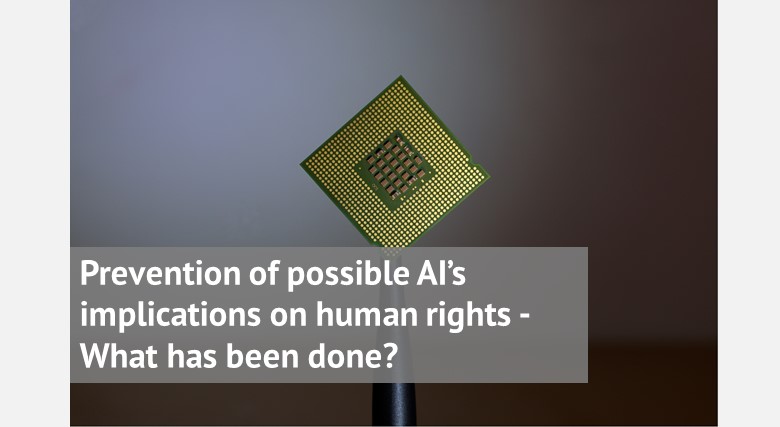According to Elon Musk, Artificial Intelligence (AI) is humanity’s “biggest existential threat” and it can be compared to “summoning the demon”. This apocalyptic rhetoric coming from someone who believes that the future will bring numerous technological miracles, from electric cars, connecting our brains to computers, to colonies on Mars, can be interpreted as a warning that AI can have negative impacts on humanity. Even though, AI would create new opportunities in solving pressing global issues (energy efficiency, reduction of pollution, food security to name a few), there is an ongoing concern that AI can lead to mass job losses and income inequality, biased algorithm-based decision-making outcomes and breach of privacy rights. The risks of unregulated AI can be unprecedented and the consequences of AI’s rapid advance for democracy, human rights and the rule of law are not clear. Thus, there is a question whether and how the UN and the EU could develop a human rights-based approach to AI.
The EU’s approach to AI
The EU has recently launched initiatives to address major human rights challenges and to lead the development of a human-centric AI. The European Commission communication on artificial intelligence for Europe (April 2018), under the section Preparing for socioeconomic changes, has emphasized the need to invest in people as a cornerstone of a human-centric approach to AI, and to address three key challenges:
- to prepare the society as a whole;
- to help workers in jobs which are likely to be the most transformed or to disappear due to automation, robotics and AI, and
- to train more specialists in AI
The High-Level Expert Group on Artificial Intelligence (AI HLEG) has as an objective to support the implementation of the European Strategy on Artificial Intelligence and during the first year after its creation in June 2018, the AI HLEG delivered the following documents: Ethics Guidelines on Artificial Intelligence, that address values protected by the Charter of Fundamental Rights, such as privacy and personal data protection, human dignity, non-discrimination and consumer protection, and Policy and Investment Recommendations, containing 33 recommendations ‘‘that can guide Trustworthy AI towards sustainability, growth and competitiveness, as well as inclusion – while empowering, benefiting and protecting human beings’’. Both documents highlight that AI should be developed and deployed with an ethical purpose, based in fundamental rights, societal values and the ethical principles of beneficence, non-maleficence, and justice.
The UN approach to AI
The need to map and design policies that will foster the discussion on the global governance of AI has been recognized by the UN. Thus, the Centre for Policy Research at the United Nations University has created the AI and Global Governance Platform as an inclusive space for researchers, policy actors, corporate and thought leaders to explore the global policy challenges raised by artificial intelligence. The platform has three overarching themes:
- AI and the global order (AI’s impact on the transformation of the geopolitical order and the response of multilateral institutions)
- The governance of AI (considering how AI’s risks and unintended consequences are minimized and its social benefits are maximized through governance frameworks)
- The mapping of AI future (focusing on scenarios, interactions and tensions between different actors responsible for the design, deployment, sponsorship and governance of AI)
The Platform aims to support UN Member States, multilateral agencies, funds, programmes and other stakeholders by helping them to consider and establish both their own and their collective roles in shaping the governance of AI.
What does the future hold?
Regulating AI and establishing global and regional frameworks are indispensable for avoiding all possible negative consequences of AI on humanity and human rights. transforming our lives in many visible and invisible ways, asking for rules setting. From predicting our choices, recognizing our faces, increasing farming efficiency, to taking over dangerous jobs (as defusing bombs, dealing with hazardous chemicals), AI has been incorporated in our everyday life. The presence of robots is not yet common but in the near future, we can expect more of them. AI can bring the enhancement of humanity, but at the same time the moral dilemmas and the perils of implementation are many. Humans need to take of AI, otherwise it will take charge of them. And the winner is only one.
Photo by Brian Kostiuk – @BriKost on Unsplash

